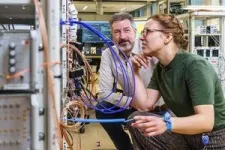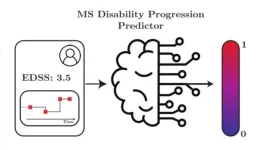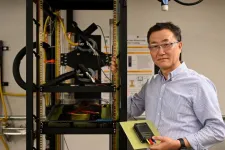Rainfall patterns have become more erratic over the past century: Solid evidence of human impact
2024-07-25
(Press-News.org)
Rainfall fluctuates more vigorously. Why? Scientists say it's because of us.
Many people around the world have noticed that rainfall is becoming increasingly erratic. Intense downpours are occurring more frequently, while dry periods seem to last longer and become more severe. These changes have raised concerns and prompted scientists to investigate the links between climate change and these unpredictable rainfall patterns.
A new study provides the first systematic observational evidence that human-induced climate change is making rainfall patterns more volatile globally.
Published in the journal Science on July 26, a joint study by the Institute of Atmospheric Physics (IAP) of the Chinese Academy of Sciences, the University of Chinese Academy of Sciences (UCAS), and the UK Met Office shows a systematic increase in rainfall variability since the 1900s from global to regional scales and from daily to intraseasonal timescales.
Rainfall variability refers to the unevenness in the timing and amount of rainfall. Higher variability means that precipitation is more unevenly distributed over time, resulting in wetter wet periods and drier dry periods. For example, some places may receive a year's worth of rain in just a few days, have long dry spells followed by heavy downpours, or alternate rapidly between drought and flooding.
While climate models have predicted that this variability will increase with future warming, this study confirms that this pattern has already emerged over the past century.
By analyzing a wide range of observational data, the researchers found that rainfall variability has increased since the 1900s over 75% of the land areas studied, particularly in Europe, Australia, and eastern North America. The researchers found that daily rainfall variability has increased globally by 1.2% per decade.
"The increase in rainfall variability is mainly due to anthropogenic greenhouse gas emissions, which have led to a warmer and more humid atmosphere. This means that even if the atmospheric circulation remains the same, the additional moisture in the air leads to more intense rain events and more drastic fluctuations between them," said Dr. ZHANG Wenxia, lead author of the study and associate professor at IAP. "These changes are further influenced by regional atmospheric circulation patterns on decadal time scales."
"The future we are anxious about is already here," said Dr. ZHOU Tianjun, a senior scientist at IAP and a professor at UCAS as well as the corresponding author of the study. "The increased variability in precipitation we observed adds crucial evidence of larger daily changes, making it more difficult to predict and prepare for environmental impacts."
According to Dr. WU Peili, an expert scientist at the Met Office and co-author of the study, "Rapid and extreme shifts in climate patterns also pose significant risks to the climate resilience of infrastructure, economic development, ecosystem functioning, and carbon sinks." In addition, he noted that "immediate adaptation measures are essential to address these challenges."
END
ELSE PRESS RELEASES FROM THIS DATE:
2024-07-25
In this Special Issue of Science, four Reviews and a Policy Forum explore the intersections of science, health, and policy related to the air we breathe, tackling topics including how air pollution is monitored, what impacts it has on human health, how those impacts are felt most by populations with fewer resources, and what changes we can make to the built environment to secure clean air.
In one Review, Wei Huang and colleagues discuss the new air quality guidelines from the World Health Organization (WHO) and related challenges ...
2024-07-25
Anthropogenic climate warming has led to increased precipitation variability over much of the globe, according to a new study, which points to several hotspots for this trend. This effect is particularly prominent over Europe, Australia, and eastern North America, say the study’s authors, and is largely driven by increasing atmospheric moistening and decadal-scale changes in atmospheric circulation. As the climate warms, the atmosphere becomes more capable of holding moisture, leading to greater fluctuations between extreme precipitation events and wider swings between wet and dry episodes. Such amplified ...
2024-07-25
Specific neurons in the brain’s zona incerta (ZI) play a crucial role in the early social interactions of an infant and its mother, building their bond and reducing stress, according to a new study in mice. Activation of the same neurons in adult mice increased anxiety- and fear-like responses, the study showed. In humans, as in other mammals, infants have an inborn tendency to form an attachment bond with their mothers or caregivers – a bond that plays a crucial role in the infant’s development. This bond helps newborns feel secure and serves as a safety net from which to explore their surroundings, learn, and develop crucial skills and behaviors. However, the neural mechanisms ...
2024-07-25
Machine learning models can reliably inform clinicians about the disability progression of multiple sclerosis, according to a new study published this week in the open-access journal PLOS Digital Health by Edward De Brouwer of KU Leuven, Belgium, and colleagues.
Multiple sclerosis (MS) is a chronic progressive autoimmune disease that leads to severe disability over time through a complex pattern of progression, recovery, and relapse. Its global prevalence has increased by more than 30% over the last decade. ...
2024-07-25
Novel human lung organoids can form lifelike models for tuberculosis infection, and might be used to test efficacy of anti-TB drugs.
####
Article URL: http://journals.plos.org/plospathogens/article?id=10.1371/journal. ppat.1012295
Article Title: Advances in an In Vitro Tuberculosis Infection Model Using Human Lung Organoids for Host-Directed Therapies
Author Countries: Republic of Korea
Funding: This research was supported by the Korea National Institutes of Health (NIH) (No. 2021-ER2001-00) awarded to E.M.K., the Korea Institute of Toxicology, Republic of Korea (No. 1711195891) awarded to E.M.K., the Korea Environment Industry & Technology ...
2024-07-25
Researchers at QuTech developed somersaulting spin qubits for universal quantum logic. This achievement may enable efficient control of large semiconductor qubit arrays. The research group published their demonstration of hopping spins in Nature Communications and their work on somersaulting spins in Science.
In 1998, Loss and DiVincenzo published the seminal work ‘quantum computation with quantum dots’. In their original work, hopping of spins was proposed as a basis for qubit logic, but an experimental implementation has remained lacking. After more than 20 years, experiments have caught up with theory. Researchers ...
2024-07-25
Professor Morawska, director of THRIVE, from QUT’s School of School of Earth and Atmospheric Sciences said the rapid global spread of Covid-19 had soon made it clear the world was unprepared to respond appropriately.
“In the early days of the pandemic the World Health Organisation and many national health authorities claimed the virus was ‘not in the air’ but rather present in large quantities on surfaces. This led to a misconception about how the virus was transmitted,” ...
2024-07-25
Crave that cup of coffee in the morning? Globally, consumers drink more than 2.2 billion cups daily. Someone grows all that joe: More than 100 million farmers worldwide produce coffee.
Coffee beans consumed across the globe come from two species: Coffea arabica and Coffea canephora, also known as Robusta (or Conilon) coffee. Historically, coffee drinkers prefer Arabica beans for their specific flavor and aroma, said Felipe Ferrao, a University of Florida research assistant scientist in horticultural sciences.
But by 2050, about 80% of Arabica production is predicted to decrease because of climate change. So, Ferrao and colleagues from France (RD2 Vision) and Brazil (Incaper ...
2024-07-25
COLUMBUS, Ohio – A noninvasive colorectal cancer screening test that can be done at home could reduce the risk of colorectal cancer death by 33%, according to a new study published in JAMA Network Open. This is the first study to evaluate this tool’s effectiveness in specific racial groups.
For this study, researchers at The Ohio State University Comprehensive Cancer Center – Arthur G. James Cancer Hospital and the Richard J. Solove Research Institute (OSUCCC – James), and Kaiser Permanente evaluated data from nearly 11,000 patients who underwent at-home FIT (fecal immunochemical testing) among ...
2024-07-25
Artificial intelligence (AI) is hot right now. Also hot: the data centers that power the technology. And keeping those centers cool requires a tremendous amount of energy.
The problem is only going to grow as high-powered AI-based computers and devices become commonplace. That’s why University of Missouri researcher Chanwoo Park is devising a new type of cooling system that promises to dramatically reduce energy demands.
“Cooling and chip manufacturing go hand-in-hand,” said Park, a professor of mechanical and aerospace engineering in the Mizzou College of Engineering. “Without proper cooling, components overheat and fail. Energy-efficient data centers will be key ...
LAST 30 PRESS RELEASES:
[Press-News.org] Rainfall patterns have become more erratic over the past century: Solid evidence of human impact






